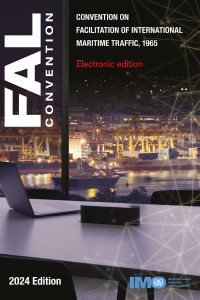
Anti-fouling systems are coatings, treatments or devices that keep the hulls of ships free from the attachment of unwanted organisms.
In response to a recognized need to control the environmental impact of harmful substances used in anti-fouling systems, in 2001 the International Maritime Organization adopted the International Convention on the Control of Harmful Anti-fouling Systems on Ships (AFS Convention), which has been in force since 2008.
This third edition of the AFS Convention publication includes the updated text of the AFS Convention, including the amendments to annexes 1 and 4 concerning the introduction of controls on cybutryne and other consequential amendments that entered into force on 1 January 2023, and the revised guidelines that support the implementation of the amended Convention.”
The harmful effects of anti-fouling systems were considered by the International Maritime Organization?s Marine Environment Protection Committee (MEPC) for the first time in 1988, when the Paris Commission requested MEPC to consider the need for measures to restrict the use of tributyltin (TBT) compounds on seagoing ships. As a first step, the Committee at its thirtieth session in 1990 adopted resolution MEPC.46(30) on ?Measures to control potential adverse impacts associated with the use of tributyltin compounds in anti-fouling paints?, which recommended that IMO Member Governments adopt measures to eliminate certain uses of TBT-based anti-fouling paints. These recommendations were intended to be interim measures until IMO could consider a possible total prohibition of TBT compounds in anti-fouling systems. From 1990 onwards, MEPC was presented with TBT monitoring results which reconfirmed the toxicity of TBT compounds, as well as with information on existing alternatives, including their effectiveness and the risk posed to the marine environment by these systems.
The twenty-first session of the IMO Assembly in 1999 adopted resolution A.895(21) urging MEPC to work towards the expeditious development of a global legally binding instrument to address the harmful effects of anti-fouling systems used on ships. The resolution stated that the global instrument, to be developed by MEPC, should ensure a global prohibition of the application of organotin compounds which act as biocides in anti-fouling systems on ships by 1 January 2003 and a complete prohibition on the presence of organotin compounds which act as biocides in anti-fouling systems on ships by 1 January 2008. A working group was established at MEPC, which took on the task of developing such a draft instrument.
Foreword
International Convention on the Control of Harmful
Anti-fouling Systems on Ships, 2001
Article 1 General obligations
Article 2 Definitions
Article 3 Application
Article 4 Controls on anti-fouling systems
Article 5 Controls of annex 1 waste materials
Article 6 Process for proposing amendments to controls
on anti-fouling systems
Article 7 Technical groups
Article 8 Scientific and technical research and monitoring
Article 9 Communication and exchange of information
Article 10 Survey and certification
Article 11 Inspections of ships and detection of violations
Article 12 Violations
Article 13 Undue delay or detention of ships
Article 14 Dispute settlement
Article 15 Relationship to international law of the sea
Article 16 Amendments
Article 17 Signature, ratification, acceptance, approval
and accession
Article 18 Entry into force
Article 19 Denunciation
Article 20 Depositary
Article 21 Languages
Contents
iv AFS CONVENTION, 2001 2023 EDITION
Annex 1 Controls on anti-fouling systems
Annex 2 Required elements for an initial proposal
Annex 3 Required elements of a comprehensive proposal
Annex 4 Surveys and certification requirements
for anti-fouling systems
Resolutions adopted by the Conference
Resolution 1 ? Early and effective application of
the International Convention on the Control of
Harmful Anti-fouling Systems on Ships
Resolution 2 ? Future work by the Organization pertaining to the
International Convention on the Control of Harmful Anti-fouling
Systems on Ships
Resolution 3 ? Approval and test methodologies for
anti-fouling systems on ships
Resolution 4 ? Promotion of technical cooperation
Guidelines developed and adopted by the Organization
2022 Guidelines for brief sampling of anti-fouling systems on ships
(resolution MEPC.356(78))
2022 Guidelines for inspection of anti-fouling systems on ships
(resolution MEPC.357(78))
2022 Guidelines for survey and certification of anti-fouling systems
on ships (resolution MEPC.358(78))
As a specialised agency of the United Nations, the International Maritime Organization (IMO) is the global standard-setting authority for the safety, security and environmental performance of international shipping. Its main role is to create a regulatory framework for the shipping industry that is fair and effective, universally adopted and universally implemented.
In other words, its role is to create a level playing field so that ship operators cannot address their financial issues by simply cutting corners and compromising on safety, security and environmental performance. This approach also encourages innovation and efficiency.
Shipping is a truly international industry, and it can only operate effectively if the regulations and standards are themselves agreed, adopted and implemented on an international basis. And IMO is the forum at which this process takes place.
- Number of Pages:
- 127
- Published Date:
- April 2023
- Book Height:
- 0 mm
- Book Width:
- 0 mm
- Author:
IMO
- Preview:
- Yes
- Publication Date:
- April 2023






